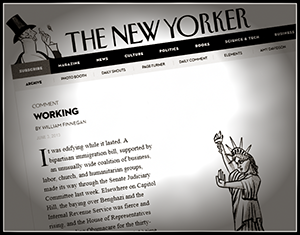William Finnegan, the accomplished New Yorker writer with an unfortunate tendency to denigrate those who resist large-scale immigration of low-skilled workers, did it again this week. This time he questioned the character and competence of those who claim that an oversupply of immigrant labor has suppressed wages among unskilled workers.
Finnegan called that concern "a venerable argument against immigration, with unfortunate nativist echoes and only a glancing association with the facts."

It was a tidy, multi-purpose put-down. Leading off with irony, it glided into ad hominem attack, then finished with a condescending comment directed at those who haven't been properly educated about the effects of low-skilled immigrants on the wages of low-skilled Americans.
As if that argument were settled. As if the facts were a settled matter.
Well, maybe they're settled for partisans like Finnegan who line up behind Berkeley economist and Canadian immigrant David Card, who has concluded that wage suppression is a myth probably motivated by antagonism. As the New York Times reported, "Card's implication is that darker forces — ethnic prejudice, maybe, or fear of social disruption — is what's really motivating a lot of anti-immigrant sentiment."
But as Finnegan should know, rival economist and Cuban immigrant George Borjas of Harvard has won praise for work that has found significant wage suppression. Borjas sees low-wage immigration as the engine of a major transfer of wealth from labor to capital.
The Card-Borjas battle played out again this week in a discussion at the Bipartisan Policy Center in Washington. There CIS Director of Research Steven Camarota defended Borjas from an attack by Card aficionado Robert Lynch of the Center for American Progress.
Lynch said that while Borjas had done excellent research 20 years ago, he has been "surpassed by better methodologies, better data sets" in the work of Card.
Camarota rallied to the defense of Borjas: "He's still considered the top guy," Camarota said. He added that the work of Giovanni Peri, an academic ally of Card, "has been shredded" in the latest edition of a major journal of economics.
Thanks to C-SPAN, you can watch the exchange here, beginning at the 50:45 mark.
Looking for neutral perspective, I contacted Lindsay Lowell, director of policy studies at the Institute for the Study of International Migration at Georgetown University. I have long respected Lowell for the nuance of his views and the depth of his scholarship.
Lowell replied that he tells his students that "the econometric literature is one of dueling statistics, with findings that immigrants both reduce and increase wages."
Lowell went on to lament that social science is a necessary tool for evidence-based policymaking, but it is imprecise. "Like any science, the personal perspectives of even rigorous scholars can color their analyses – with what researchers know as confirmation bias," he said.
Steven Colbert, the comedian who introduced us to "truthiness", has observed that reality has a liberal bias. Colbert, of course, is a liberal who plays the role of a far-out conservative. The real-life Colbert probably has a lot in common with William Finnegan.
But all of us – comedians, journalists, economists, and citizens – like to have our biases confirmed. The pleasure centers of our brain light up when we do. Maybe few of us are capable of being neutral umpires, calling balls and strikes. We call things as we see them, but we tend to see them through an ideological prism that is part of our politicized brains.
And as psychologist Drew Westen wrote, "The political brain is an emotional brain. It is not a dispassionate, calculating machine, objectively searching for the right facts, figures, and policies to make a reasoned decision."
In his reply to my query regarding Finnegan's comments, Lowell added these observations about the immigration reform bill that was just approved by the Senate Judiciary Committee and will be debated in the full Senate in a few weeks:
If pressed, I say the reports that the law of supply and demand is dead are premature. It may be that legalization is a necessary solution to an entrenched problem for a population that is already here, but the rest of the legislation will increase the numbers of low-skilled workers substantially. It is ironic that Congress would award amnesty and increase the supply of workers with whom the newly legal most directly complete for jobs.
Lowell concluded with this: "Finnegan does nothing to help establish how much immigration is good ... More, more, and more is a dubious prescription for domestic workers and an information-age economy."
